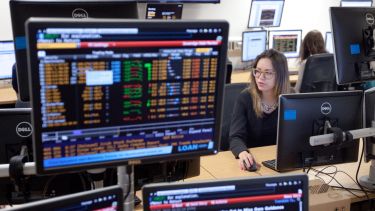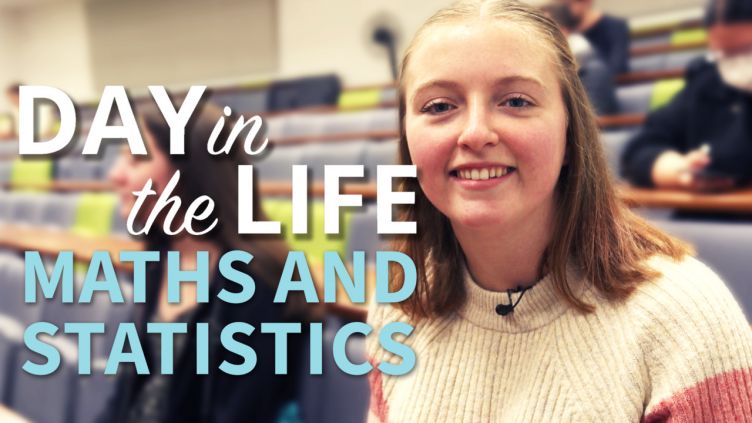Financial Mathematics BSc
2024-25 entryGet the numerical skills and specialist knowledge you need to work in finance. You’ll learn about the tools, principles and practices of the finance industry, as well as the fundamental mathematics behind banking, insurance and accountancy.
Key details
- A Levels AAB
Other entry requirements - UCAS code GN13
- 3 years / Full-time
- September start
- Find out the course fee
- Optional placement year
- Study abroad
- View 2025-26 entry
Explore this course:
Course description

Spend an immersive three years learning the principles and practices of the finance industry, and the fundamental maths behind banking, insurance, accountancy and more.
Jointly delivered by the University of Sheffield School of Mathematics and Statistics, the Department of Economics and the Management School, this financial mathematics degree teaches the numerical skills and specialist knowledge you need for your career in finance.
Your first year is about giving you the best possible grounding with maths essentials and finance-specific topics, enabling you to make an informed choice between following an economics or finance pathway.
In year two you unlock more advanced topics in economics or finance, such as microeconomics, macroeconomics, econometrics and corporate finance.
Some module options include more project work. This gives you the chance to put your mathematics skills into practice in different contexts and scenarios that you might encounter when you start work after graduation.
By third year, you’ll have the skills, knowledge and experience to go in lots of different directions in finance and mathematics. We’ll give you lots of optional modules to choose from, so you can study the topics that are most useful to the career path you want to take, or that you enjoy the most.
Why study this course?
- Leading maths research - 96% of our research is rated as world-leading or internationally excellent, according to the Research Excellence Framework 2021.
- Real-world problem solving - research unanswered questions, from the most abstract research in areas like algebraic geometry and number theory, to the calculations behind animal movements and black holes.
- Tailor your degree - you have the option to choose from an economics or management pathway, allowing you to focus on the areas you enjoy the most.
- Welcoming community for everyone - we have an active student society (SUMS), regular maths challenges, and a dedicated LGBT+ student group for maths students.
- Triple Crown Accredited Management School - The Management School is a leading business school with Triple Crown accreditation (AACSB, AMBA and EQUIS), where many academics have former industrial experience which they bring to their teaching.

Modules
A selection of modules are available each year - some examples are below. There may be changes before you start your course. From May of the year of entry, formal programme regulations will be available in our Programme Regulations Finder.
Choose a year to see modules for a level of study:
UCAS code: GN13
Years: 2023
As well as maths modules, student choose either an economics pathway or a management pathway.
Core modules:
- Mathematics Core
-
Mathematics Core covers topics which continue school mathematics and which are used throughout the degree programmes: calculus and linear algebra, developing the framework for higher-dimensional generalisation. This material is central to many topics in subsequent courses. At the same time, small-group tutorials with the Personal Tutor aim to develop core skills, such as mathematical literacy and communication, some employability skills and problem-solving skills.
40 credits - Computing and Analysis
-
This module collects together a number of the most useful topics for future modules in financial mathematics. The first semester will cover some computing, using Python to write simple programmes and LaTeX to write mathematical documents. The second semester is given to analysis, a branch of pure mathematics with applications in financial mathematics. The two semesters are independent of each other.
20 credits - Probability and Data Science
-
Probability theory is branch of mathematics concerned with the study of chance phenomena. Data science involves the handling and analysis of data using a variety of tools: statistical inference, machine learning, and graphical methods. The first part of the module introduces probability theory, providing a foundation for further probability and statistics modules, and for the statistical inference methods taught here. Examples are presented from diverse areas, and case studies involving a variety of real data sets are discussed. Data science tools are implemented using the statistical computing language R.
20 credits
Economics pathway:
- Economic Analysis and Policy
-
This is a compulsory module for all single and dual honours students in Economics. The module provides students with an introduction to microeconomic and macroeconomic analysis together with examples of their application in order to develop students' understanding of the roles of both in economic policy making.
40 credits
Management pathway:
- Introduction to Financial Accounting
-
Financial Accounting is concerned with the ways in which the financial transactions of a business are recorded and summarised in financial statements. This module provides an introduction to the construction of financial statements and an understanding and evaluation of the principles and concepts on which they are underpinned. Once the principles have been established, the module further develops the practical understanding of the preparation of financial statements and focuses on the preparation, interpretation and limitations of company financial statements and the regulatory framework in which they are prepared.
20 credits - Foundations in Financial Management
-
This module aims to create a foundation of knowledge in the subject area of financial management, creating the required framework of skill and knowledge for financial decision making and to provide a base of knowledge for the related modules in levels 2 and 3. This module will achieve this by introducing the essential principles, theories and calculations within financial management. It will also introduce the contemporary issues and developments in financial markets. The module design and content expects to at least cover the contents of foundation level financial management related module syllabus of professional accounting bodies.
20 credits
In the second year, you’ll continue to build a powerful toolbox of mathematical techniques which you can apply to increasingly complex problems. You’ll be able to examine more advanced topics in finance too such as microeconomics, macroeconomics, econometrics and corporate finance.
Core modules:
- Mathematics Core II
-
Building on Level 1 Mathematics Core, Mathematics Core II will focus on foundational skills and knowledge for both higher mathematics and your future life as a highly skilled, analytically-astute worker. Mathematical content will focus on topics that are vital for all areas of the mathematical sciences (pure, applied, statistics), such as vector calculus and linear algebra. This will help develop your analytic and problem solving skills. Alongside this, you will continue to develop employability skills, building on Level 1 Core. Finally, there will be opportunities to learn and reflect on social, ethical, and historical aspects of mathematics, which will enrich your understanding of the importance of mathematics in the modern world.
30 credits - Stochastic Modelling
-
Many things about life are unpredictable. Consequently, it often makes sense to incorporate some randomness in mathematical models of natural and physical processes. Such models are called 'stochastic models' and are the study object of this module. We will learn about a number of general models for processes where the state of a system is fluctuating randomly over time. Examples might include the length of a queue, the size of a reproducing population, or the quantity of water in a reservoir. We will cover various techniques for analysis of such models, setting the student up for further study of stochastic processes and probability at levels 3 and 4.
10 credits - Statistical Inference and Modelling
-
Statistical inference and modelling are at the heart of data science, a field of rapidly-growing importance in the modern word. This module develops methods for analysing data, and provides a foundation for further study of probability and statistics at higher Levels. You will learn about a range of standard probability distributions beyond those met at Level 1, including multivariate distributions. You will learn about sampling theory and summary statistics, and their relation to data analysis. You will discover how to parametrise various types of statistical model, learn techniques for determining whether one model is 'better' than another for understanding a dataset, and learn how to ascertain how good a statistical model is at explaining trends in data. The software package R will be used throughout.
20 credits
A student will take 20 credits from either this group:
- Analysis and Algebra
-
This module will build on the theory built in Level 1 'Foundations of Pure Mathematics', focusing on the twin pillars of analysis and algebra. These are not only fundamental for pure mathematics at higher levels, but provide rigorous theory behind core concepts that are used throughout the mathematical sciences. Whilst to some extent you have been doing analysis and algebra since you were at school, here you will be going much deeper. You will examine why familiar tools, like differentiation and integration, actually work. Familiar objects, such as vectors, differential operators, and matrices, will be unpacked; powerful, formal properties of these objects proved. Ultimately, this rigorous foundation will enable you to extend these tools and concepts to tackle a far greater set of problems than before.
20 credits
Or this group:
- Scientific Computing
-
The ability to programme is a central skill for any highly-numerate person in the 21st century. This module builds on skills learned at Level 1 in 'Mathematical Investigation Skills' by developing skills in computer programming and independent investigation. You will learn how to solve various mathematical problems in programming languages commonly-used by mathematicians, for example Python. You will learn basic computational and visualisation methods for exploring numerical solutions to equations (including differential equations), and then apply this knowledge to explore the behaviour of example physical systems that these equations might model.
10 credits - Analysis
-
This module will build on the theory built in Level 1 'Foundations of Pure Mathematics', focusing specifically on analysis. This provides rigorous theory behind core concepts that are used throughout the mathematical sciences. Whilst to some extent you have been doing analysis since you were at school, in the form of calculus, here you will be going much deeper. You will examine why familiar tools, like differentiation and integration, actually work. This allows powerful, formal properties of these objects to be proved. Ultimately, this rigorous foundation will enable you to extend these tools and concepts to tackle a far greater set of problems than before.
10 credits
Or this group:
- Mathematics and Statistics in Action
-
In this project module, you will investigate one or more case studies of using mathematics and statistics for solving empirical (i.e. 'real world') problems. These case studies will illustrate the process of mathematical and statistical modelling, whereby real-world questions are translated to mathematical and/or statistical questions. Students will see how techniques learned earlier in their degree can be used to explore these problems. There will be a mix of individual and group projects to choose from, and some projects may involve the use of R or Python, but 'MAS116 Mathematical Investigations Skills' is not a prerequisite. Students will be expected to work independently (either individually or in a small group). However, the topic and scope of each piece of project work will be clearly defined by the lecturer in charge of the topic.
10 credits - Analysis
-
This module will build on the theory built in Level 1 'Foundations of Pure Mathematics', focusing specifically on analysis. This provides rigorous theory behind core concepts that are used throughout the mathematical sciences. Whilst to some extent you have been doing analysis since you were at school, in the form of calculus, here you will be going much deeper. You will examine why familiar tools, like differentiation and integration, actually work. This allows powerful, formal properties of these objects to be proved. Ultimately, this rigorous foundation will enable you to extend these tools and concepts to tackle a far greater set of problems than before.
10 credits
A student will take 40 credits from either the economics pathway:
- Intermediate Microeconomics
-
This module builds on Level 1 modules in microeconomics and mathematical economics, using the mathematical training to allow a more rigorous investigation of the principles of microeconomics. It aims to develop an understanding and ability to undertake economic analysis of models of the behaviour and interaction of economic agents (consumers, firms and government) in a market economy, the functioning of different types of industries, decision making under uncertainty and economic welfare.
20 credits - Intermediate Macroeconomics
-
The aims of this course are to provide firm grounding in the analytical tools of modern macroeconomics; to use these tools to understand critically the conduct of economic policy nationally and internationally. The course builds on level 1 modules in macroeconomics. The main subject areas covered are: Basic macroeconomic models: consumption/leisure choice, closed economy one period-macro models, models of search and unemployment; Savings, investment and government deficits: consumption/savings choice (two-period model), credit market imperfections, real intertemporal model with investment; Money and business cycles: flexible price models, New Keynesian economics (sticky prices), inflation; International macroeconomics: international trade, money in open economy; Economic growth: Malthus and Solow growth models, convergence, endogenous growth model.
20 credits
Or the management pathway:
- Introduction to Corporate Finance and Asset Pricing
-
This course builds on the concepts developed in MGT212. The course focuses on the more quantitative and advanced aspects of finance and is aimed at those students who intend to specialize in finance. The purpose of the course is to give a solid foundation in principles of corporate finance and asset pricing to understand and analyze the major issues affecting the financial policies of corporations. More specifically, the following topics will be dealt with: the time value of money, capital budgeting techniques, cash flows, risk/return trade-offs, portfolio theory, market efficiency, capital structure, payout policy, and option pricing. The course is a prerequisite for the final-year finance modules MGT321 (Corporate Finance) and MGT375 (Introduction to Financial Derivatives).
20 credits - Financial Management
-
This unit takes the key themes and techniques that were introduced in MGT141, Introduction to Financial Management, and locates them in their institutional and intellectual setting to enable students to reflect critically on understandings of financial institutions and phenomena. The resulting understanding and skills of critique will enhance students' capabilities to reflect on the more specialist bodies of knowledge encountered in financial management and finance units in subsequent semesters. The unit uses a combination of conventional lectures to familiarise students with ideas and tutorials in which students are encouraged to show their understanding of and critically evaluate content of lectures.
20 credits
As well as maths modules, student choose either an economics pathway or a management pathway.
Core modules:
- Stochastic Processes and Finance
-
A stochastic process is a mathematical model for phenomena unfolding dynamically and unpredictably over time. This module studies two classes of stochastic process particularly relevant to financial phenomena: martingales and diffusions. The module develops the properties of these processes and then explores their use in Finance. A key problem considered is that of the pricing of a financial derivative such as an option giving the right to buy or sell a stock at a particular price at a future time. What is such an option worth now? Martingales and stochastic integration are shown to give powerful solutions to such questions.
20 credits - Financial Mathematics
-
The discovery of the Capital Asset Pricing Model by William Sharpe in the 1960's and the Black-Scholes option pricing formula a decade later mark the beginning of a very fruitful interaction between mathematics and finance. The latter obtained new powerful analytical tools while the former saw its knowledge applied in new and surprising ways. (A key result used in the derivation of the Black-Scholes formula, Ito's Lemma, was first applied to guide missiles to their targets; hence the title 'rocket science' applied to financial mathematics). This course describes the mathematical ideas behind these developments together with their application in modern finance.
10 credits - Time Series
-
Time series are observations made in time, for which the time aspect is potentially important for understanding and use. The course aims to give an introduction to modern methods of time series analysis and forecasting as applied in economics, engineering and the natural, medical and social sciences. The emphasis will be on practical techniques for data analysis, though appropriate stochastic models for time series will be introduced as necessary to give a firm basis for practical modelling. Appropriate computer packages will be used to implement the methods.
10 credits
Optional maths modules include:
- Bayesian Statistics
-
This module develops the Bayesian approach to statistical inference. The Bayesian method is fundamentally different in philosophy from conventional frequentist/classical inference and is becoming the approach of choice in many fields of applied statistics. This course will cover both the foundations of Bayesian statistics, including subjective probability, inference, and modern computational tools for practical inference problems, specifically Markov Chain Monte Carlo methods and Gibbs sampling. Applied Bayesian methods will be demonstrated in a series of case studies using the software package R.
10 credits - Codes and Cryptography
-
The word 'code' is used in two different ways. The ISBN code of a book is designed in such a way that simple errors in recording it will not produce the ISBN of a different book. This is an example of an 'error-correcting code' (more accurately, an error-detecting code). On the other hand, we speak of codes which encrypt information - a topic of vital importance to the transmission of sensitive financial information across the internet. These two ideas, here labelled 'Codes' and 'Cryptography', each depend on elegant pure mathematical ideas: codes on linear algebra and cryptography on number theory. This course explores these topics, including the real-life applications and the mathematics behind them.
10 credits - Combinatorics
-
Combinatorics is the mathematics of selections and combinations. For example, given a collection of sets, when is it possible to choose a different element from each of them? That simple question leads to Hall's Theorem, a far-reaching result with applications to counting and pairing problems throughout mathematics.
10 credits - Complex Analysis
-
It is natural to use complex numbers in algebra, since these are the numbers we need to provide the roots of all polynomials. In fact, it is equally natural to use complex numbers in analysis, and this course introduces the study of complex-valued functions of a complex variable. Complex analysis is a central area of mathematics. It is both widely applicable and very beautiful, with a strong geometrical flavour. This course will consider some of the key theorems in the subject, weaving together complex derivatives and complex line integrals. There will be a strong emphasis on applications. Anyone taking the course will be expected to know the statements of the theorems and be able to use them correctly to solve problems.
10 credits - Game Theory
-
The module will give students the opportunity to apply previously acquired mathematical skills to the study of Game Theory and to some of the applications in Economics.
10 credits - Generalised Linear models
-
This module introduces the theory and application of generalised linear models. These models can be used to investigate the relationship between some quantity of interest, the 'dependent variable', and one more 'explanatory' variables; how the dependent variable changes as the explanatory variables change. The term 'generalised' refers to the fact that these models can be used for a wide range of different types of dependent variable: continuous, discrete, categorical, ordinal etc. The application of these models is demonstrated using the programming language R.
10 credits - Graph Theory
-
A graph is a simple mathematical structure consisting of a collection of points, some pairs of which are joined by lines. Their basic nature means that they can be used to illustrate a wide range of situations. The aim of this course is to investigate the mathematics of these structures and to use them in a wide range of applications.
10 credits - Knots and Surfaces
-
The course studies knots, links and surfaces in an elementary way. The key mathematical idea is that of an algebraic invariant: the Jones polynomial for knots, and the Euler characteristic for surfaces. These invariants will be used to classify surfaces, and to give a practical way to place a surface in the classification. Various connections with other sciences will be described.
10 credits - Machine Learning
-
Machine learning lies at the interface between computer science and statistics. The aims of machine learning are to develop a set of tools for modelling and understanding complex data sets. It is an area developed recently in parallel between statistics and computer science. With the explosion of 'Big Data', statistical machine learning has become important in many fields, such as marketing, finance and business, as well as in science. The module focuses on the problem of training models to learn from training data to classify new examples of data.
10 credits - Probability with Measure
-
Probability is a relatively new part of mathematics, first studied rigorously in the early part of 20th century. This module introduces the modern basis for probability theory, coming from the idea of 'measuring' an object by attaching a non-negative number to it. This might refer to its length or volume, but also to the probability of an event happening. We therefore find a close connection between integration and probability theory, drawing upon real analysis. This rigorous theory allows us to study random objects with complex or surprising properties, which can expand our innate intuition for how probability behaves. The precise material covered in this module may vary according to the lecturer's interests.
10 credits - Medical Statistics
-
This course comprises sections on Clinical Trials and Survival Data Analysis. The special ethical and regulatory constraints involved in experimentation on human subjects mean that Clinical Trials have developed their own distinct methodology. Students will, however, recognise many fundamentals from mainstream statistical theory. The course aims to discuss the ethical issues involved and to introduce the specialist methods required. Prediction of survival times or comparisons of survival patterns between different treatments are examples of paramount importance in medical statistics. The aim of this course is to provide a flavour of the statistical methodology developed specifically for such problems, especially with regard to the handling of censored data (eg patients still alive at the close of the study). Most of the statistical analyses can be implemented in standard statistical packages.
10 credits - Operations Research
-
Mathematical Programming is the title given to a collection of optimisation algorithms that deal with constrained optimisation problems. Here the problems considered will all involve constraints which are linear, and for which the objective function to be maximised or minimised is also linear. These problems are not continuously differentiable; special algorithms have to be developed. The module considers not only the solution of such problems but also the important area of post-optimality analysis; i.e. given the solution can one answer questions about the effect of small changes in the parameters of the problem (such as values of the cost coefficients)?
10 credits - Sampling Theory and Design of Experiments
-
The results of sample surveys through opinion polls are commonplace in newspapers and on television. The objective of the Sampling Theory section of the module is to introduce several different methods for obtaining samples from finite populations. Experiments which aim to discover improved conditions are commonplace in industry, agriculture, etc. The purpose of experimental design is to maximise the information on what is of interest with the minimum use of resources. The aim of the Design section is to introduce some of the more important design concepts.
10 credits
Economics pathway:
- Advanced Microeconomics
-
This module is designed to further develop students' understanding of core microeconomic principles by exploring a number of advanced topics in microeconomics. The course material will be predominately theoretical with a substantial mathematical component and some evaluation of empirical evidence. Indicative topics include: decision-making under uncertainty; insurance markets, principal-agent theory, risk aversion and risky asset holdings; cooperative and non-cooperative bargaining; economics of sporting contests.
20 credits - Advanced Macroeconomics
-
This module is designed to cover topics which illustrate and amplify the core teaching in macroeconomics at level two. Topics include Dynamic general equilibrium theory of consumption and saving, Consumption theory, Macroeconomic Risk, Real business cycle and fiscal policy, Financial frictions and credit constraints, Nominal economy and monetary policy, Economic growth and finance.
20 credits - Further Econometrics
-
This module is designed to introduce students to a number of important advanced topics in econometrics. The aims of the module are to provide: an overview of modern econometric methodology; an introduction to further econometric techniques; and an introduction to applied econometric research methods. The module will cover topics in both microeconometrics and times series econometrics.
20 credits - Modern Finance
-
The aim of this module is to introduce some of the main principles of modern finance. This is an analytical module which reflects the quantitative nature of the subject and each topic is developed from first principles. The topics covered include: the time value of money and its applications; risk return and diversification; introduction to portfolio selection; the capital asset pricing model (CAPM) and its use; and an introduction to the role of utility theory in finance and company capital structure. The aims of the module are to: Provide an introduction to portfolio theory, i.e., the concept of financial risk and behaviour of rational, risk-averse investors; Leading to a general equilibrium picture of financial asset returns and prices; Explore corporate financial decision making in the major areas of Capital Structure (the mix of equity and debt financing used to finance the firm’s investments); Introduce students to concepts of Stock Market Efficiency and Option Pricing, considering in particular alternative pricing models.
20 credits
Management pathway:
- Modern Finance
-
The aim of this module is to introduce some of the main principles of modern finance. This is an analytical module which reflects the quantitative nature of the subject and each topic is developed from first principles. The topics covered include: the time value of money and its applications; risk return and diversification; introduction to portfolio selection; the capital asset pricing model (CAPM) and its use; and an introduction to the role of utility theory in finance and company capital structure. The aims of the module are to: Provide an introduction to portfolio theory, i.e., the concept of financial risk and behaviour of rational, risk-averse investors; Leading to a general equilibrium picture of financial asset returns and prices; Explore corporate financial decision making in the major areas of Capital Structure (the mix of equity and debt financing used to finance the firm’s investments); Introduce students to concepts of Stock Market Efficiency and Option Pricing, considering in particular alternative pricing models.
20 credits - Corporate Finance
-
The course unit covers more advanced topics in corporate finance - such as financing and investment decisions under asymmetric information - and valuation techniques for investment appraisal - such as real option pricing. Some of the fundamental assumptions underlying corporate finance such as the efficient market hypothesis are also challenged and an alternative approach to finance, behavioural finance, is reviewed. Financial operations such as mergers and acquisitions and initial public offerings are also discussed. As this course unit is highly quantitative, it requires a good knowledge of the basic mathematical concepts (e.g. probability calculus and derivatives), statistics (e.g. regression analysis, normal distributions and variance analysis) and the financial concepts reviewed in MGT230.
20 credits - Financial Derivatives
-
Over the last thirty years, the worldwide derivatives market has grown enormously in size and importance. This growth is due in part to the long-term consequences of the now famous option pricing formula developed by Black, Scholes and Merton and published in 1973 and the increase in the volatility of many financial instruments over the last 30 years. Futures and options, which are both derivative securities, are increasingly used by many participants in financial markets. This includes bankers, fund managers, security and currency traders in the world's major financial centres, but also increasingly extends to the finance departments of public and private sector organizations. This module aims to provide an introduction to the pricing and use of some of the basic types of derivative securities. Reflecting the subject, the module is analytical in nature. All concepts are taught from first principles. The course is self-contained to a large extent and includes lectures on the underlying financial economics as well as necessary mathematics and statistics.
20 credits
The content of our courses is reviewed annually to make sure it's up-to-date and relevant. Individual modules are occasionally updated or withdrawn. This is in response to discoveries through our world-leading research; funding changes; professional accreditation requirements; student or employer feedback; outcomes of reviews; and variations in staff or student numbers. In the event of any change we'll consult and inform students in good time and take reasonable steps to minimise disruption.
Learning and assessment
Learning
You'll learn through lectures, problems classes in small groups and research projects. Some modules also include programming classes.
Assessment
You will be assessed in a variety of ways, depending on the modules you take. This can include quizzes, examinations, presentations, participation in tutorials, projects, coursework and other written work.
Programme specification
This tells you the aims and learning outcomes of this course and how these will be achieved and assessed.
Entry requirements
With Access Sheffield, you could qualify for additional consideration or an alternative offer - find out if you're eligible.
The A Level entry requirements for this course are:
AAB
including A in Maths
- A Levels + a fourth Level 3 qualification
- ABB, including A in Maths + B in a relevant EPQ; ABB, including A in Maths + B in A Level Further Maths
- International Baccalaureate
- 34, with 6 in Higher Level Maths (Analysis and Approaches)
- BTEC Extended Diploma
- DDD in Engineering with Distinctions in all Maths units
- BTEC Diploma
- DD + A in A Level Maths
- Scottish Highers + 1 Advanced Higher
- AAABB + A in Maths
- Welsh Baccalaureate + 2 A Levels
- B + AA, including Maths
- Access to HE Diploma
- Award of Access to HE Diploma in a relevant subject, with 45 credits at Level 3, including 36 at Distinction (to include Maths units), and 9 at Merit
-
We will give your application additional consideration if you have passed the Sixth Term Examination Paper (STEP), STEP 2 or STEP 3, at grade 3 or above. We do not consider STEP results in place of a third A Level
The A Level entry requirements for this course are:
ABB
including A in Maths
- A Levels + a fourth Level 3 qualification
- ABB, including A in Maths + B in a relevant EPQ; ABB, including A in Maths + B in A Level Further Maths
- International Baccalaureate
- 33, with 6 in Higher Level Maths (Analysis and Approaches)
- BTEC Extended Diploma
- DDD in Engineering with Distinctions in all Maths units
- BTEC Diploma
- DD + A in A Level Maths
- Scottish Highers + 1 Advanced Higher
- AABBB + A in Maths
- Welsh Baccalaureate + 2 A Levels
- B + AB, including A in Maths
- Access to HE Diploma
- Award of Access to HE Diploma in a relevant subject, with 45 credits at Level 3, including 30 at Distinction (to include Maths units), and 15 at Merit
-
We will give your application additional consideration if you have passed the Sixth Term Examination Paper (STEP), STEP 2 or STEP 3, at grade 3 or above. We do not consider STEP results in place of a third A Level
You must demonstrate that your English is good enough for you to successfully complete your course. For this course we require: GCSE English Language at grade 4/C; IELTS grade of 6.5 with a minimum of 6.0 in each component; or an alternative acceptable English language qualification
Equivalent English language qualifications
Visa and immigration requirements
Other qualifications | UK and EU/international
If you have any questions about entry requirements, please contact the department.
Graduate careers
School of Mathematics and Statistics
Strong mathematics skills open all kinds of doors for our graduates: from banking, insurance and pensions, to software development at tech companies and encryption services at security agencies. They also work for businesses with vast amounts of data to process and inform new products and services.
Organisations that have hired Sheffield maths graduates include AstraZeneca, BAE Systems, Barclays, Bet365, Dell, Deloitte, Goldman Sachs, GSK, HSBC, IBM, Lloyds, PwC, Unilever, the Civil Service and the NHS. Lots of our students also go on to do PhDs at world top 100 universities.
Your career in mathematics and statistics
Management School
We have a dedicated employability team who offer careers support, and can help you to find jobs or placement opportunities, and develop essential skills through workshops with industry experts. You're supported throughout your course and after graduation.
We work with businesses and organisations to ensure the content of our courses are up-to-date and relevant, and that the skills and experience you'll gain meet the demands of future employers
Sheffield University Management School careers
School of Mathematics and Statistics

When new students join the School of Mathematics and Statistics, we want them to feel part of a community. At the heart of this is the Sheffield University Mathematics Society, or SUMS, who organise activities throughout the academic year – from charity fundraisers to nights out. Our students also take part in pizza lectures, rocket engineering projects, international maths challenges, and an LGBT+ support group for maths students.
Staff in the School of Mathematics and Statistics work on a wide range of topics, from the most abstract research in areas like algebraic geometry and number theory, to the calculations behind animal movements and black holes. They’ll guide you through the key concepts and techniques that every mathematician needs to understand and give you a huge range of optional modules to choose from.
The department is based in the Hicks Building, which has classrooms, lecture theatres, computer rooms and social spaces for our students. It’s right next door to the Students' Union, and just down the road from the 24/7 library facilities at the Information Commons and the Diamond.
School of Mathematics and StatisticsManagement School

We are a world leading management school with Triple Crown accreditation (AACSB, AMBA and EQUIS).
These awards have been achieved through the outstanding quality of our programmes, research output, support for students and alumni, and links with industry. We have a world-class reputation for high quality teaching, ground-breaking research and cutting-edge thinking.
You’ll be part of a dynamic and engaging management school that puts you and your future at the heart of everything it does. We balance a rigorous academic foundation with practical skills to ensure you are ready for the world of work.
We want you to develop skills so you can apply course content in a company setting. Our close links with organisations keep us in tune with the changing demands of the workplace. We know what employers are looking for.
You'll learn from experts - many of our academics are former industry professionals and they work closely with businesses. Because our academics are world-leading researchers, your education will draw on the most current management theories.
We want you to engage with the academic content, be conscientious and take an independent approach to study.
We'll help you to be informed, innovative and proactive and do everything we can to support and enhance your career, steering you in the right direction with all the knowledge and skills you require.
You'll benefit from tailored on-site and online professional careers support, dedicated skills sessions and events with experts from world-leading organisations and professional bodies. These activities will help guide your personal and professional development to help you secure the right work experience for you.
Management School students are based in our building on Conduit Road.
Facilities
The Management School building includes learning facilities such as lecture theatres, seminar rooms, trading and computer rooms, our academic and professional staff, the Courtyard Café, and our Employability hub and Student Experience Office. Teaching takes place at various venues across campus.
The Management School has invested in an impressive, fully-equipped financial trading room, built around Bloomberg and Refinitiv Eikon.
These terminals are used by traders, banks and multinational companies to trade financial securities, gain market insights and undertake research. You will also have the opportunity to gain certification that demonstrates competence in these systems, which will add real value to your CV.
Management SchoolWhy choose Sheffield?
The University of Sheffield
Number one in the Russell Group
National Student Survey 2023 (based on aggregate responses)
92 per cent of our research is rated as world-leading or internationally excellent
Research Excellence Framework 2021
Top 50 in the most international universities rankings
Times Higher Education World University Rankings 2023
Number one Students' Union in the UK
Whatuni Student Choice Awards 2023, 2022, 2020, 2019, 2018, 2017
Number one for teaching quality, Students' Union and clubs/societies
StudentCrowd 2023 University Awards
A top 20 university targeted by employers
The Graduate Market in 2023, High Fliers report
School of Mathematics and Statistics
Research Excellence Framework 2021
Management School
AACSB, AMBA and EQUIS
Graduate Outcomes 2020-21
Fees and funding
Fees
Additional costs
The annual fee for your course includes a number of items in addition to your tuition. If an item or activity is classed as a compulsory element for your course, it will normally be included in your tuition fee. There are also other costs which you may need to consider.
Funding your study
Depending on your circumstances, you may qualify for a bursary, scholarship or loan to help fund your study and enhance your learning experience.
Use our Student Funding Calculator to work out what you’re eligible for.
Placements and study abroad
Placement
Study abroad
Visit
University open days
We host five open days each year, usually in June, July, September, October and November. You can talk to staff and students, tour the campus and see inside the accommodation.
Subject tasters
If you’re considering your post-16 options, our interactive subject tasters are for you. There are a wide range of subjects to choose from and you can attend sessions online or on campus.
Offer holder days
If you've received an offer to study with us, we'll invite you to one of our offer holder days, which take place between February and April. These open days have a strong department focus and give you the chance to really explore student life here, even if you've visited us before.
Campus tours
Our weekly guided tours show you what Sheffield has to offer - both on campus and beyond. You can extend your visit with tours of our city, accommodation or sport facilities.
Apply
Contact us
- Telephone
- +44 114 222 3999
- maths.admiss@sheffield.ac.uk
The awarding body for this course is the University of Sheffield.
Recognition of professional qualifications: from 1 January 2021, in order to have any UK professional qualifications recognised for work in an EU country across a number of regulated and other professions you need to apply to the host country for recognition. Read information from the UK government and the EU Regulated Professions Database.
Any supervisors and research areas listed are indicative and may change before the start of the course.




 2.JPG.jpg?itok=JY72zTzQ)
